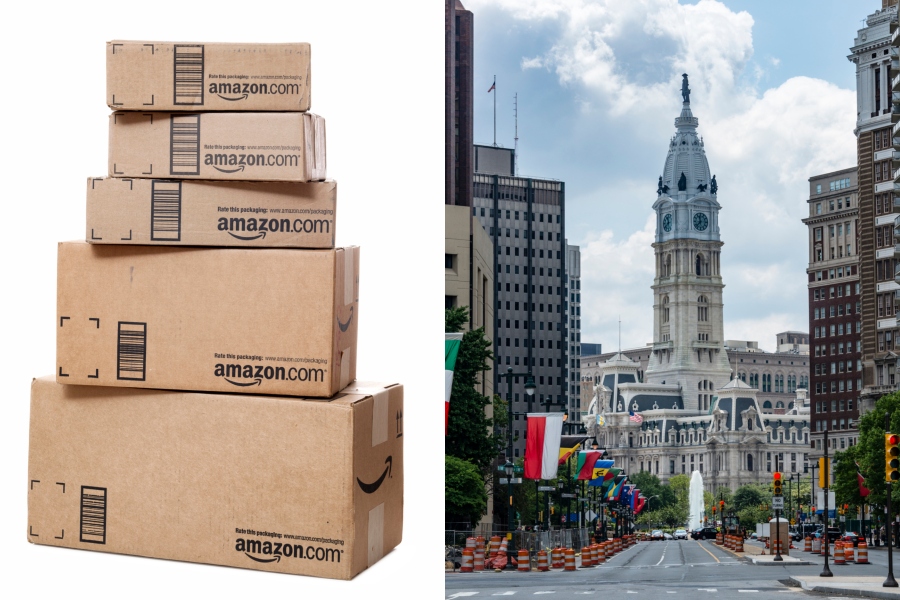Philadelphia Dodged a Major Bullet by Not Getting Amazon HQ2
Now that the tech giant has decided to split its investment between Northern Virginia and New York, we should be asking ourselves one question: When are we finally going to look inward?

Philly will not be the home of Amazon HQ2. Thank goodness.
On Monday night, I did a happy dance.
After a year of anxious hype and legitimate caution, news finally broke that Amazon’s second headquarters won’t be coming to Philly. The e-commerce giant has decided to split its 50,000-job investment between Northern Virginia’s Crystal City and New York City.
“While Philadelphia was not ultimately chosen for Amazon’s HQ2, I thank Amazon for its consideration and am honored that we were among the top contenders,” Mayor Jim Kenney said in a statement. “I also recognize the value of this competitive process, which has benefited our city in many ways. It put Philadelphia in the national (and international) spotlight – increasing our visibility to other companies and showing our viability for other large-scale projects.”
My gut-reaction to this news: Thank God, Buddha, Allah, the Sky, Earth, and Moon, in no particular order. Our city just dodged a major bullet.
When we were first announced as one of the top 20 finalists (and possibly in the top 10), I wondered whether I’d eventually have to move out of Philly, but I can breathe a little easier now. And really, looking back, the writing was on the wall from the jump: We don’t have a good-enough tech economy, Amazon’s functionaries weren’t warming up to us, and major news outlets didn’t even bother to analyze at all.
On top of that, Amazon HQ2 would have been the final gentrification blow to the city that ultimately priced out low-income communities. Philly would have ended up in the same predicament as Amazon’s first headquarters in Seattle, where an apartment downtown cost $42.08 per square foot to rent in 2016, compared to $39.79 in 2015 and $31.38 in 2009. Given that our city already has enough problems with urban decay, poverty, and the lack of guilt many newcomers feel about perpetuating gentrification, Amazon HQ2 in Philly would have only extinguished any chance of improving our communities.
Which is why no tears should be shed over this blessing in disguise. We still have our innovative colleges and hospitals — along with the headquarters of Comcast, Aramark, and now GoPuff — to keep us relevant. Philly can now use this opportunity to focus on the communities we’ve been neglecting outside of Center City and hopefully produce a robust campaign just like we did for Amazon.
Although Mayor Kenney promised to be more transparent while in office, his administration has not been the best at letting the public know what all their bid with Amazon included. After months of delaying a response, we now know that the city was willing to hand out over a billion dollars in tax incentives within the next 20 years if Amazon had come here. It’s disheartening that a lot of information in the proposal is still being withheld from the public in the name of protecting partners looking to secure future business opportunities. Now that we’ve been officially ruled out of having an Amazon Armageddon hit Philly, it’s time to look inward to overcome some longstanding societal hurdles.
Now would be the best time to improve campaigns for grant money to address our mass incarceration, poverty, and education woes. Rather than wasting money we don’t have on high-tech pipe dreams, we should be investing it in local programs that are already doing the work. While the city produced Amazon pitch videos that didn’t accurately reflect the Philadelphia I know and love, we should now be taking a step back and asking ourselves why we can’t turn such illusions into realities. One of the pitch videos sent to Amazon praised Philly’s diversity as if we still aren’t one of the most segregated major cities in the country. There’s no way Amazon could have ignored the harsh realities that still hinder our city.
A wise local once described Philadelphia as “small town masquerading as a big city.” Despite our desire to compete with the rest of the world, there’s still a lot of left at home to attend to.


